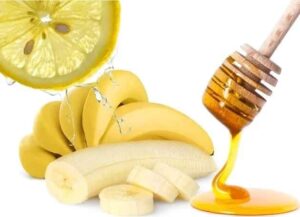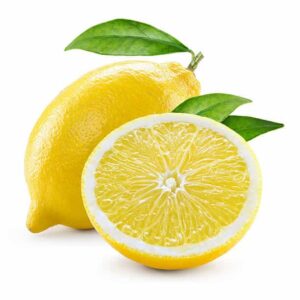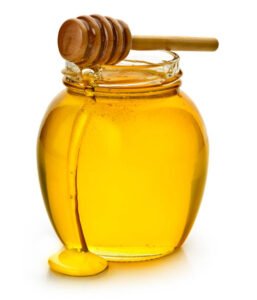Lemon Banana Honey face mask are a fantastic way to nourish and rejuvenate the skin. Among the various homemade options, a mask made from lemon, banana, and honey stands out due to its natural ingredients that offer a plethora of skin benefits. This guide details how to make and apply this simple yet effective mask.
 Ingredients Needed
Ingredients Needed
- Lemon: Freshly squeezed lemon juice
- Banana: Ripe banana
- Honey: Pure, organic honey
These ingredients combine to create a mask that is rich in vitamins, antioxidants, and natural exfoliants.
Steps to Make the Lemon, Banana, and Honey Face Mask
Preparing the Ingredients
1. Lemon:
- Selection: Pick a fresh, juicy lemon. Organic lemons are ideal to avoid pesticide residues.
- Juicing: Cut the lemon in half. Using a juicer or simply squeezing by hand, extract the juice from one half. You should get about 1-2 tablespoons of lemon juice.
2. Banana:
- Selection: Choose a ripe banana with brown spots on the peel for easy mashing and maximum nutrient content.
- Mashing: Take half of the banana and place it in a small bowl. Use a fork or a spoon to mash it thoroughly until you achieve a smooth, lump-free paste.
3. Honey:
- Selection: Use pure, organic honey. Raw honey is even better if available.
- Measuring: Measure out 1 tablespoon of honey.
Mixing the Ingredients
- Combine the Ingredients:
- Place the mashed banana in a clean bowl.
- Add the freshly squeezed lemon juice to the bowl.
- Pour in the measured tablespoon of honey.
Mixing Process:
- Use a spoon or a small whisk to mix all the ingredients together.
- Stir the mixture thoroughly until it is smooth and uniform. The final consistency should be thick enough to stay on your face without dripping but smooth enough to spread easily.
- Adjust the texture if necessary: If the mixture is too runny, add more mashed banana. If it’s too thick, add a bit more lemon juice or honey to achieve the right consistency.
Preparation:
Cleanse Your Face:
- Begin by washing your face thoroughly with a gentle cleanser suited to your skin type. This step is crucial to remove any dirt, oil, or makeup that could obstruct the mask’s ability to penetrate the skin. Use lukewarm water to open up your pores, enhancing the mask’s absorption.
- Gently massage the cleanser into your skin in circular motions, focusing on areas where you typically accumulate more oil or impurities, like the T-zone (forehead, nose, and chin).
- Rinse your face well and pat it dry with a soft, clean towel. Avoid rubbing your skin to prevent irritation and ensure it’s completely dry, as this helps the mask adhere better.
Optional: Exfoliate for Deeper Penetration:
- If you want to maximize the mask’s effectiveness, consider exfoliating your skin after cleansing. This helps remove dead skin cells and allows the active ingredients in the mask to penetrate more deeply.
- Use a mild exfoliant and gently scrub your skin, then rinse and pat dry.
Optional: Steam for Enhanced Absorption:
- Steaming your face can further open your pores and enhance the mask’s effectiveness. You can do this by leaning over a bowl of hot water for a few minutes or using a warm, damp towel as a compress on your face.
Application Process:
Apply the Mask:
- Using clean fingers or a facial brush, scoop a small amount of the mask mixture and begin applying it to your face. Start from the forehead and spread it evenly, working your way down to your cheeks, nose, and chin.
- Apply the mask in a thin, even layer. Avoid the delicate areas around your eyes and lips, as the lemon juice in the mask can be too acidic and potentially irritating for these sensitive regions.
- Ensure all areas of your face are covered, paying extra attention to areas that might need more nourishment or have more visible skin issues.
Even Coverage:
- Make sure the layer is smooth and even. It should be thin enough to stay on your face without dripping but thick enough to provide full coverage.
- You can use gentle upward strokes to apply the mask, which not only helps spread it evenly but also promotes circulation.
Relax and Let It Work:
- Relaxation Time:
- Leave the mask on for 10-15 minutes. This is a great opportunity to relax and unwind. You might want to lie down and close your eyes, practice deep breathing, or listen to calming music.
- During this period, the banana, honey, and lemon will work together to nourish, hydrate, and revitalize your skin. You might feel a slight tingling sensation due to the lemon juice, which is normal and usually indicates the mask is working. However, if you experience any discomfort or burning, rinse off the mask immediately.
Rinse Off:
Removing the Mask:
- After the mask has had time to work, rinse it off thoroughly with lukewarm water. Use gentle circular motions to help the water dissolve and wash away the mask, which also provides a light exfoliation.
- Be sure to remove all traces of the mask, paying attention to areas around the nose and hairline.
Final Rinse:
- Finish with a splash of cool water to help close your pores and refresh your skin. This step helps tighten the skin and reduces any potential irritation from the lemon juice.
Dry Your Face:
- Gently pat your face dry with a clean, soft towel. Again, avoid rubbing your skin to prevent irritation.
Post-Mask Care:
Moisturize:
- Immediately after drying your face, apply your favorite moisturizer. This helps lock in the moisture and benefits of the mask, keeping your skin hydrated and smooth.
- Choose a moisturizer that suits your skin type, whether it’s a light gel for oily skin or a rich cream for dry skin. Apply it with gentle upward strokes to further boost circulation.
Sun Protection:
- Given that lemon juice can make your skin more sensitive to sunlight, it’s best to apply this mask in the evening or on days when you don’t plan to be exposed to direct sunlight. If you do go outside, make sure to apply a broad-spectrum sunscreen to protect your skin from UV damage.
Hydration and Aftercare:
- Drink plenty of water after your facial treatment to keep your skin hydrated from the inside out.
- Follow up with your regular skincare routine, including toner and serum, if you use them, to maintain the balance and health of your skin.
By following these steps, you’ll ensure that the Lemon, Banana, and Honey Face Mask provides maximum benefits, leaving your skin feeling refreshed, nourished, and revitalized.
Final Tips
- Frequency: Use this mask once or twice a week for the best results.
- Patch Test: If you have sensitive skin, do a patch test on a small area of your skin before applying the mask to your face.
- Storage: This mask is best used fresh. However, you can store any leftover mixture in the refrigerator for up to a day.
By following these simple steps, you can enjoy the natural benefits of lemon, banana, and honey, leaving your skin feeling refreshed, smooth, and radiant.
Benefits of Lemon, Banana, and Honey for Facial Skin
When it comes to skincare, natural ingredients like lemon, banana, and honey have been used for centuries due to their remarkable benefits. Let’s delve into the specific advantages each of these ingredients offers for facial skin.
 1. Lemon
1. Lemon
Lemons are a powerhouse of nutrients and antioxidants, making them a popular ingredient in skincare.
Rich in Vitamin C: Lemons are highly concentrated in vitamin C, a potent antioxidant that helps combat free radicals and stimulates collagen production. This can lead to firmer, smoother skin with reduced appearance of fine lines and wrinkles.
Natural Exfoliant: The citric acid in lemon acts as a natural exfoliant, gently sloughing off dead skin cells. This helps to brighten the complexion and improve skin texture, revealing fresher, more youthful skin underneath.
Skin Brightening: Regular use of lemon juice can help to lighten dark spots, hyperpigmentation, and acne scars due to its natural bleaching properties. This results in a more even skin tone.
Antibacterial and Antiseptic: Lemons possess antibacterial and antiseptic qualities, making them effective in treating and preventing acne. They can reduce the bacteria on the skin’s surface, which helps in minimizing breakouts.
Oil Control: For those with oily skin, lemon juice can help regulate excess oil production. The astringent properties of lemon can reduce shine and minimize the appearance of pores.
 2. Banana
2. Banana
Bananas are not just a nutritious fruit but also a boon for skincare, offering multiple benefits.
Deep Hydration: Bananas are rich in moisture and natural oils, which can deeply hydrate and moisturize the skin. This is particularly beneficial for dry or dehydrated skin, helping to restore softness and suppleness.
Packed with Vitamins and Minerals: Bananas contain vitamins A, B, and E, along with essential minerals like potassium. Vitamin A helps fade dark spots and blemishes, vitamin B boosts skin health and appearance, while vitamin E acts as an antioxidant to fight against skin damage from free radicals.
Anti-Aging Properties: The presence of antioxidants and nutrients in bananas helps to combat the signs of aging, such as wrinkles and fine lines. They help in maintaining skin elasticity and firmness.
Natural Exfoliant: The texture of mashed banana provides gentle exfoliation, removing dead skin cells and unclogging pores without the harshness of synthetic scrubs.
Soothing and Healing: Bananas have anti-inflammatory properties that can soothe irritated or inflamed skin. They are particularly good for calming redness and can help in the healing process of acne and other skin issues.
 3. Honey
3. Honey
Honey is one of nature’s most revered skincare ingredients, known for its versatility and multitude of benefits.
Natural Humectant: Honey is a natural humectant, meaning it draws moisture into the skin from the air. This helps to keep the skin hydrated, plump, and soft, making it an excellent ingredient for dry skin.
Antibacterial and Antimicrobial: Honey’s antibacterial and antimicrobial properties make it effective in fighting acne-causing bacteria. It helps to keep the skin clear and free from blemishes.
Rich in Antioxidants: Honey is packed with antioxidants, which help to protect the skin from environmental damage and oxidative stress. This can slow down the aging process and keep the skin looking youthful.
Healing Properties: Honey’s natural enzymes and nutrients promote the healing of minor skin injuries and can soothe conditions like eczema and psoriasis. It is known for its ability to repair and regenerate skin tissue.
Pore Cleansing: Honey has mild exfoliating properties that help to unclog pores and remove impurities. It also balances the bacteria on the skin, making it a great cleanser for acne-prone skin.
Soothing and Calming: The soothing properties of honey can help calm irritated or sensitive skin, reducing redness and inflammation.
Conclusion
Combining lemon, banana, and honey in a face mask leverages their individual benefits, providing a comprehensive treatment for various skin concerns. Lemons brighten and exfoliate, bananas hydrate and heal, while honey moisturizes and protects. Together, they create a powerful natural remedy for healthier, more radiant skin.
Contraindications for Using a Lemon, Banana, and Honey Face Mask
While the lemon, banana, and honey face mask offers numerous benefits, it’s essential to be aware of potential contraindications and precautions. Not all skin types react the same way to natural ingredients, and improper use can lead to adverse effects.
1. Lemon
Lemon juice is highly acidic and can pose several risks if not used properly:
Skin Sensitivity and Irritation: The high concentration of citric acid in lemon juice can cause irritation, redness, or a stinging sensation, especially in individuals with sensitive skin or those prone to allergic reactions. It’s crucial to dilute lemon juice adequately and perform a patch test before full application.
Photosensitivity: Lemon juice can make your skin more sensitive to sunlight. Exposure to UV rays after applying lemon juice can lead to a condition called phytophotodermatitis, which causes severe burns, blisters, and darkening of the skin. It’s advisable to use this mask in the evening and always apply sunscreen during the day.
Drying Effect: Lemon juice can strip the skin of its natural oils, leading to dryness and potential irritation. Individuals with dry or combination skin should be cautious and ensure they follow up with a good moisturizer.
2. Banana
Bananas are generally gentle on the skin, but there are still a few considerations to keep in mind:
Allergic Reactions: Although rare, some individuals may be allergic to bananas. Symptoms can include itching, redness, and swelling. As with any new skincare ingredient, a patch test is recommended to ensure there’s no allergic reaction.
Pore-Clogging Concerns: For individuals with acne-prone or very oily skin, the natural sugars and oils in bananas may contribute to clogged pores if not washed off thoroughly. It’s essential to rinse off the mask completely and use a gentle cleanser if necessary.
3. Honey
Honey is well-tolerated by most people, but it does have a few precautions:
Allergic Reactions: Those with allergies to pollen or bee products should be cautious when using honey on their skin. Allergic reactions can manifest as redness, itching, or swelling. Performing a patch test can help prevent unexpected allergic responses.
Potential for Contamination: Unprocessed or raw honey may contain bacteria or spores that can cause infections, particularly in individuals with compromised immune systems or those with open wounds or cuts on their face. Using pasteurized honey can mitigate this risk.
General Precautions and Tips
Patch Test: Always conduct a patch test before applying the mask to your face. Apply a small amount of the mixture to the inside of your wrist or behind your ear and wait for 24 hours to check for any adverse reactions.
Avoid Sensitive Areas: Do not apply the mask to sensitive areas such as the eyes, lips, or any broken or irritated skin. The ingredients, particularly lemon juice, can cause significant irritation in these areas.
Frequency of Use: Limit the use of this mask to once or twice a week. Overuse, especially of lemon juice, can disrupt the skin’s natural pH balance and lead to increased sensitivity and dryness.
Proper Application and Removal: Ensure the mask is applied to a clean face and rinsed off thoroughly after 10-15 minutes. Use lukewarm water to remove the mask gently, avoiding harsh rubbing or scrubbing.
Consultation with a Dermatologist: If you have existing skin conditions, such as eczema, rosacea, or severe acne, consult with a dermatologist before incorporating this or any new mask into your skincare routine. They can provide personalized advice based on your skin type and condition.
Click here if you want to see more articles from the beauty category.
Reference:
- Philippe G. Humbert, Marek Haftek, Pierre Creidi, Charles Lapière, Betty Nusgens, Alain Richard, Daniel Schmitt, André Rougier, Hassan Zahouani – Topical ascorbic acid on photoaged skin. Clinical, topographical and ultrastructural evaluation: double-blind study vs. placebo
- Yong Chool Boo – Ascorbic Acid (Vitamin C) as a Cosmeceutical to Increase Dermal Collagen for Skin Antiaging Purposes: Emerging Combination Therapies
- Cent Asian J Glob Health. 2016; 5(1): 241. – Honey: A Therapeutic Agent for Disorders of the Skin
- Henry W. G. Birt, Anthony B. Pattison, Adam Skarshewski, Jeff Daniells, Anil Raghavendra & Paul G. Dennis – The core bacterial microbiome of banana (Musa spp.)
- Wilfried Rähse – Proven Active Ingredients for Various Categories of Skin Creams

 Ingredients Needed
Ingredients Needed 1. Lemon
1. Lemon 2. Banana
2. Banana 3. Honey
3. Honey